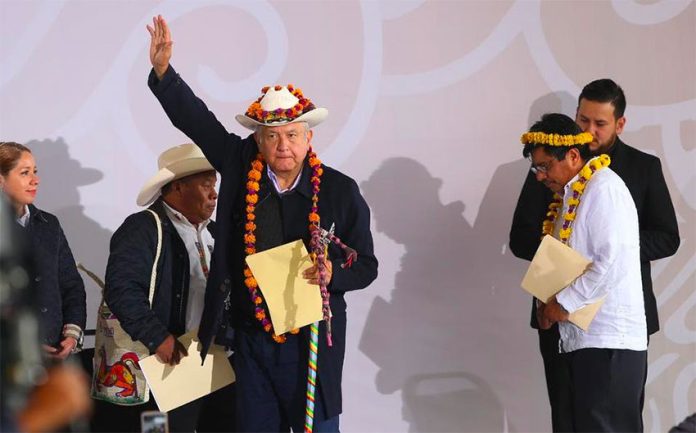A weekend pledge by President López Obrador to reroute a natural gas pipeline away from “sacred hills” in Puebla could ultimately help finish the project, according to experts.
López Obrador told indigenous residents of the Sierra Norte in Puebla on Saturday that his government will not allow the Canadian company TC Energy to build the pipeline through areas they consider sacred.
“. . . Even if we have to pay [for the rerouting], the gas pipeline will not pass through the sacred hills . . . We’re going to propose other routes that don’t affect the sacred areas . . .” he said at an event in Pahuatlán.
“. . . We inherited a lot of rotten things [from past governments] but now it’s not the same politics as before, there have been changes. I can tell you that we haven’t handed out a single mining concession . . .” López Obrador said.
Residents of the Sierra Norte have opposed the the Tuxpan-Tula pipeline project for the past four years on the grounds that it would damage the environment and their traditional way of life.
Completion of the 90-kilometer middle section of the 286-kilometer-long pipeline – which was tendered by the Federal Electricity Commission (CFE) to supply its combined-cycle power plants in Veracruz, Puebla and Hidalgo – has been delayed while the Energy Secretariat carries out consultations with indigenous communities.
Mexico City-based energy consultant Gonzalo Monroy told the website Natural Gas Intel (NGI) that López Obrador’s promise could be good news for the pipeline, which was first announced in 2015.
The CFE needs to get the project finished, he said, because it will allow fuel oil used at the power plants to be replaced with cheaper natural gas.
“I think that it was actually a very pragmatic decision by López Obrador, saying if they have to pay extra for the rerouting, so be it.”
José Valera of global law firm Mayer Brown told NGI that “it’s possible that a rerouting is properly warranted” although he conceded that “it could increase costs.”
The “bottom line,” he added, is that “it’s not necessarily . . . improper or undue on the part of a government to put a hold on a project like this, given this type of local opposition.”
NGI reported that no date has been set for the completion of the pipeline although TC Energy’s Francois Poirier, who oversees the company’s Mexico operations, said in November that it was expected to begin operations two years after the completion of the indigenous consultation.
Monroy highlighted that nobody yet knows what the new route will be or how additional rights of way will be obtained.
The government reached an agreement in August last year to modify contracts signed with TC Energy and two other companies that built pipelines for the CFE.
López Obrador said the accord would save the government US $4.5 billion because it reduced the amount it has to pay the firms to transport natural gas through the Texas-Tuxpan and Samalayuca-Sásabe pipelines.
However, no pact has been announced to change the contracts for the Tuxpan-Tula and Tula-Villa de Reyes lines, both of which are TC Energy projects.
López Obrador and CFE director Manuel Bartlett have characterized the terms of the contracts as unfair.
Source: Natural Gas Intel (en), Milenio (sp)
